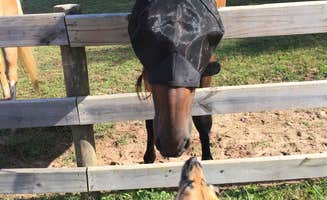The Cohutta Wildlife Management Area hosts several equestrian campgrounds near Talking Rock, Georgia where riders can access extensive trail networks through the southern Appalachians. Located in north Georgia at elevations between 1,200-3,000 feet, these camping areas experience mild spring and fall temperatures with summer highs averaging 85°F. Winter camping remains popular among equestrians who prefer the less crowded trails and improved visibility through leafless forests.
What to do
Horseback riding on wilderness trails: At Jacks River Fields Campground, riders can access the Benton McKaye trail directly from the campground. "There's a hiking trail that connects to the Benton McKaye just across from campsite and if you are bringing horses there are two paddocks for them as well," notes Liz B., highlighting the convenient trail access.
Creek fishing and swimming: The Conasauga River and smaller creeks offer fishing opportunities throughout the area. At Hickey Gap, campers can fish directly from their sites. "This was a beautiful little spot next to a creek. There are 5 sites in all," reports Mike H., though he cautions about wildlife: "I saw 3 copper heads at the creek," adds Bob P.
Waterfall hiking: Several trails from horse campgrounds lead to scenic waterfalls. "There's a giant waterfall down the trail if you can make the trek," mentions Julia B. about the trail from Hickey Gap campground. Most waterfall hikes range from 1-3 miles one-way and are accessible to hikers of moderate experience levels.
What campers like
Secluded camping spots: The horse campgrounds provide privacy even during peak season. At Don Carter State Park, "Site 7 is separate from the others and has the whole point except there is a trail behind the site," Christine reports, highlighting the privacy available at certain locations.
Clean facilities despite remote settings: Many equestrian campgrounds maintain good facilities. At Gee Creek Campground, campers appreciate the amenities: "Nice bathhouse that is cleaned multiple times a day. The Rangers check in daily and are very friendly," shares Anna M. about the facilities available to both equestrian and regular campers.
Quiet weekday experiences: Most horse campgrounds near Talking Rock see minimal use during weekdays. "I went to Don Carter mid week after a holiday and the place was pretty empty. While usually that would be a bit weird this park made it one of the most amazing feelings on earth," writes Crystal C., who enjoyed having "a private beach all to myself."
What you should know
Bear activity is common: Bears frequent these campgrounds, requiring proper food storage. "There was a pit toilet with plenty of toilet paper and it was quite clean. There's also a bear box and signs clearly indicating there are bears around and that you should keep all food in your vehicle or use the box," warns Mike H. about camping at Hickey Gap.
Road conditions can be challenging: Forest service roads to equestrian campgrounds often require careful driving. "The road up there is all rock/dirt with a several hundred foot drop-off on the right side and no guardrail. There were a few hairpin turns. And then the driveway to and from the camp area is quite steep," cautions Mike H. about access to Hickey Gap.
Cell service is limited: Most equestrian campsites have no reception. "There's no cell service or security so make sure you're making safe decisions," advises Julia B. about the remoteness of Hickey Gap campground.
Tips for camping with families
Look for campgrounds with playground options: Some horse-friendly campgrounds also offer family amenities. "A trail runs the perimeter of the camp and the Hiwasee River runs next to the campground. The campground also has a playground to keep kids entertained," notes Anna M. about Gee Creek Campground.
Bring water toys for creek play: Children enjoy wading and exploring the shallow creek areas. "My girls group and I wanted to do a quick weekend glamping trip. One long rocky road and an active bear warning later we were rocking it by the creek. Bring a bathing suit and some good hiking shoes," suggests Julia B.
Consider tent camping areas separate from horse trailers: Some campgrounds offer dedicated tent sections away from the equestrian areas. At Trackrock Campground, "We tent camped here October 2013 on site 36 which backed up to the national forest. Beautiful mountain views and horseback riding on site," reports Elaine H., noting the benefit of having a tent site with forest access.
Tips from RVers
Scout access roads before bringing large rigs: Some horse campgrounds have challenging approach roads. "Fifth Wheel Owners BEWARE! Very steep and unlevel roads; especially when leaving. Our camper came in contact with the side of our bed and tailgate multiple times," warns Anthony M. about his experience at Trackrock, where his fifth wheel sustained damage.
Select level sites carefully: Even designated RV sites at horse campgrounds may require significant leveling. "Road needs some work sites aren't super level but it was ok," notes Kathy C. about her stay at Trackrock Campground, suggesting that preparation with leveling blocks is essential.
Consider site orientation for shade: Summer heat can affect RV comfort at horse campgrounds. "We stayed in our trusty pop up camper so direct sun is always an issue (non-insulated bunk ends) but a travel trailer/RV would probably fare well (as far as temp goes)," advises George & Patty C. about their experience at Don Carter State Park.


